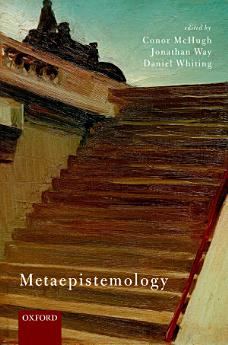Metaepistemology
Conor McHugh · Jonathan Way · Daniel Whiting
Dis 2018 · Oxford University Press
E-book
240
Mga Page
family_home
Kwalipikado
info
reportHindi na-verify ang mga rating at review Matuto Pa
Tungkol sa ebook na ito
Epistemology, like ethics, is normative. Just as ethics addresses questions about how we ought to act, so epistemology addresses questions about how we ought to believe and enquire. We can also ask metanormative questions. What does it mean to claim that someone ought to do or believe something? Do such claims express beliefs about independently existing facts, or only attitudes of approval and disapproval towards certain pieces of conduct? How do putative facts about what people ought to do or believe fit in to the natural world? In the case of ethics, such questions have been subject to extensive and systematic investigation, yielding the thriving subdiscipline of metaethics. Yet the corresponding questions have been largely ignored in epistemology; there is no serious subdiscipline of metaepistemology. This surprising state of affairs reflects a more general tendency for ethics and epistemology to be carried out largely in isolation from each other, despite the important substantive and structural connections between them. A movement to overturn the general tendency has only recently gained serious momentum, and has yet to tackle metanormative questions in a sustained way. This edited collection aims to stimulate this project and thus advance the new subdiscipline of metaepistemology. Its original essays draw on the sophisticated theories and frameworks that have been developed in metaethics concerning practical normativity, examine whether they can be applied to epistemic normativity, and consider what this might tell us about both.
Tungkol sa may-akda
Conor McHugh is Associate Professor in Philosophy at the University of Southampton. He works on a range of topics in epistemology, philosophy of mind, and ethics broadly construed. These include the nature of belief and of attitudes more generally, normativity, reasons and reasoning, mental agency, doxastic non-voluntarism and self-knowledge. He has published in ^iEthics, Mind, Philosophy and Phenomenological Research, Philosophical Issues, Philosophical Studies, Analysis, Analytic Philosophy, Erkenntnis, Thought, Synthese, the European Journal of Philosophy, Pacific PhilosophicalN Quarterly^r, and collections published by OUP and Ithaque, among other places. Jonathan Way is Associate Professor in Philosophy at the University of Southampton. He works on a range of topics in ethics and epistemology, broadly construed. These include the nature of reasons, rationality, value, normativity, and reasoning. He has published papers in Ethics, Mind, Philosophy and Phenomenological Research, Australasian Journal of Philosophy, Philosophical Studies, Philosophical Quarterly, Oxford Studies in Metaethics, Philosophical Issues, the Oxford Handbook of Reasons and Normativity, and Analysis, among other places. Daniel Whiting is Professor in Philosophy at the University of Southampton. He works on a wide range of subjects, including epistemology, ethics, philosophy of language, aesthetics, philosophy of mind, and the history of philosophy. Recent topics include: reasons and rationality; the norms of belief, assertion, and practical reasoning; normative testimony; and epistemic value. He has published numerous papers in journals such as Noûs, Philosophical Studies, Analysis, Erkenntnis, British Journal of Aesthetics, Journal of Ethics and Social Philosophy, Canadian Journal of Philosophy, and Pacific Philosophical Quarterly.
I-rate ang e-book na ito
Ipalaam sa amin ang iyong opinyon.
Impormasyon sa pagbabasa
Mga smartphone at tablet
I-install ang Google Play Books app para sa Android at iPad/iPhone. Awtomatiko itong nagsi-sync sa account mo at nagbibigay-daan sa iyong magbasa online o offline nasaan ka man.
Mga laptop at computer
Maaari kang makinig sa mga audiobook na binili sa Google Play gamit ang web browser ng iyong computer.
Mga eReader at iba pang mga device
Para magbasa tungkol sa mga e-ink device gaya ng mga Kobo eReader, kakailanganin mong mag-download ng file at ilipat ito sa iyong device. Sundin ang mga detalyadong tagubilin sa Help Center para mailipat ang mga file sa mga sinusuportahang eReader.







